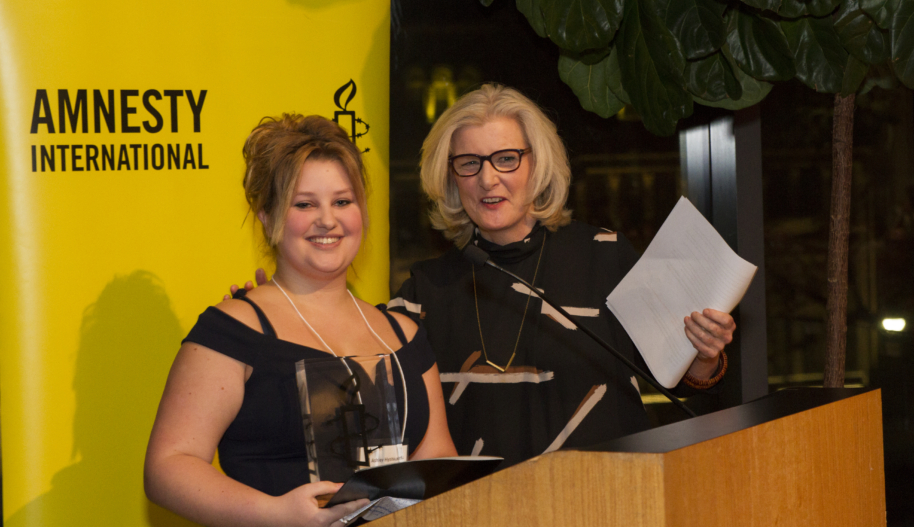Amnesty International Canada is proud to announce that Ashley Hyshka has won its annual Youth Media Award. Her story “No More Stolen Sisters”, won the national award and was published on February 15, 2018 in “The Runner,” a student-owned newspaper with Kwantlen Polytechnic University (KPU) in Surrey, B.C. She is the third national youth media award winner and the first to be awarded from British Columbia.
“Stolen Sisters examines the plight of missing and murdered indigenous women and girls in B.C., and the institutional errors that may have contributed to some of their deaths. The author has personalized the piece in compelling fashion with interlinked profiles of a frustrated cop and Lorelei Williams, whose family has known only violence,” said Rick MacInnes-Rae, renowned former journalist and volunteer Amnesty Media Award judge. “The story is harrowing in addressing the frequent errors made by police when confronted with probable causes for actions they subsequently did not take. Had some of the leads been followed, it seems clear some of the tragic history might not have occurred.”
Ashley received her Amnesty Media Youth Award in Toronto on April 4, 2018, along with professional media award winners: Nathan VanderKlippe of the Globe and Mail, Margaret Evans, Stephanie Jenzer and Richard Devey of the CBC, Sally Armstrong and Peter Bregg of the United Church Observer and Denise Ryan of the Vancouver Sun. These exceptional journalists were recognized for their powerful, front-line reporting on grave human rights crises.
“Getting to attend the Amnesty International Canada Media Awards in Toronto on April 4th was one of the best nights of my life,” said Hyshka. “Living in Vancouver and it being the last few weeks of my undergraduate degree, I was unsure if I’d be able to make the awards show. I feel honoured to have been selected by Amnesty for this award, and I was in awe to be surrounded by such a passionate mix of remarkable award-winning journalists and advocates who defend human rights when no one else will. Several days after the awards show, a part of me still feels like the entire journey has been surreal. The response to my feature article is more than I ever dreamed possible.”
In her research for the story, Hyshka interviewed Lorelei Williams, an advocate for missing and murdered Indigenous women and girls’ and the founder of “Butterflies in Spirit”, a dance troupe that honours missing and murdered loved ones. Lorelei’s aunt, Belinda Williams went missing without a trace in 1978, and also her cousin Tanya Holyk vanished in 1996; her DNA was discovered on serial killer Robert Pickton’s farm six years later.
Ashley then contacted former Vancouver Police Department officer Dave Dickson, a 25-year veteran who spent the entirety of his career on Vancouver’s Downtown Eastside. Dickson dedicated his career to protecting the downtrodden citizens of society. Hyshka reported that Dickson eventually noticed that one-by-one women went missing. In the summer of 1998, Dickson had compiled a list of 31 women who’d simply vanished. He took it to the Vancouver Police Department (VPD) to get them to investigate, but his concerns were met with indifference, with one VPD superior saying they didn’t want to waste resources on a case with no bodies or crime scene. In a second attempt, Dickson provided his superiors with a list of murder victims who’d been picked up in the Downtown Eastside and argued that the murders could potentially be related. But one VPD superior said that they weren’t going to waste money “looking for fucking whores,” Dickson told Hyshka. During this time, Robert Pickton was preying on even more victims in the Downtown Eastside.
“For a while I’d struggled to connect these two stories into one cohesive narrative, but on a hunch, I examined a PDF report from the Wally Oppal Inquiry, which was tasked with determining how Pickton was able to remain active for so long. In the document I searched the words “Tanya Holyk”. Buried within the report was a paragraph reciting the names of the women who were listed in Dickson’s original missing persons list – staring back at me was the name “Tanya Holyk” – Lorelei’s missing cousin,” said Hyshka.
“This story made me livid, it made me want to cry, and it made me feel inspired and hopeful. I lost many hours of sleep thinking about the story. Simply put, it was a labour of love
For further information, please contact:
Elizabeth Berton-Hunter, Media Relations 416-363-9933 ext 332 bberton-hunter@amnesty.ca
Jacob Kuehn, Media Relations 613-744-7667 ext 236 jkuehn@amnesty.ca













